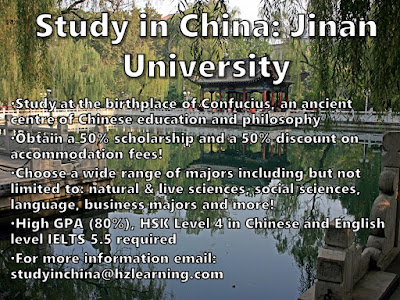Study in Jinan: Reflecting on the life of Confucius
Hongzhou Learning is offering an amazing opportunity for international students to receive a scholarship in Jinan University, Shandong province. Successful candidates can receive a 50% discount on tuition and accommodation fees in studying a wide range of disciplines. But, in considering this institution, one might wonder just what is the significance of the area its in? And how does it tie into China's wider history and culture? Shandong province has a huge significance. It was once the home of Confucius, the most famous Chinese thinker and philosopher of all time. Confucius' theories of society, family and life have had a longstanding influence on shaping not just China, but all of the countries around it. As you study in Jinan, you have the opportunity to be inspired by his legacy that through your work, you can make a lasting impression on the world.
Just who was Confucius? Confucius lived around the time of the 6th century BC, it was a time of upheaval, uncertainty and change in ancient China. This period, known as the "warring states" period, saw the disintegration of the Zhou dynasty and the emergence of numerous kingdoms contending for power and territory, with absence of a central authority. The crisis era would inspire a golden age of philosophy and thought as to how to augment stability and unity within China. The man who would become known as Confucius, or locally known as 孔子 (kongzi) would be one of such thinkers. Seeking to create harmony and unity in China, he would articulate an entire theory of governance which stressed social relationships and obedience as prerequisites to a successful society. He sought to be a political advisor to kings and princes throughout the many states, however his ideas did not gain traction in his lifetime. After his death, key works such as "The analects" would be wrote by his disciples and centuries later, become a staple of the Chinese system.
What exactly did he teach? Confucius taught that there was a natural order to society and that each person had a designated purpose and set of obligations to fulfill. Children were to honour parents, wives their husbands, students their teachers and subjects their rulers. At the same time, he placed focus on outward, ritualistic behaviours called 礼 (li). By honouring designated relationships and following the Li strictly, Confucius believed that people could be naturally transformed into being good as people went about their relationships harmoniously and understood their purpose. This would mean there was no longer any need for violence or conflict in society. Example and instruction superseded coercion and force. He believed that if people failed to follow the Li, then they would lose face and feel shame in society.
Centuries later, Confucius' teachings live on. Although his philosophy is no longer taught by the authorities as it was in the dynasties of old, its nevertheless continues to be an influence in how people live. It has set a foundation for the importance of the family as the central unit of Chinese society. Through honouring official relationships, people in China obligate themselves to the cause of their parents and their children. In public, people still place emphasis on "face" and correct behaviour, all which derived from Confucian teaching.
Thus, by coming to China and studying in Shandong province, you have the opportunity to retrace the steps and life of Confucius. It is a context where you might be inspired by a whole world of history, culture and philosophy. What can you discover? Who can you become? Join our program and find out!



评论
发表评论